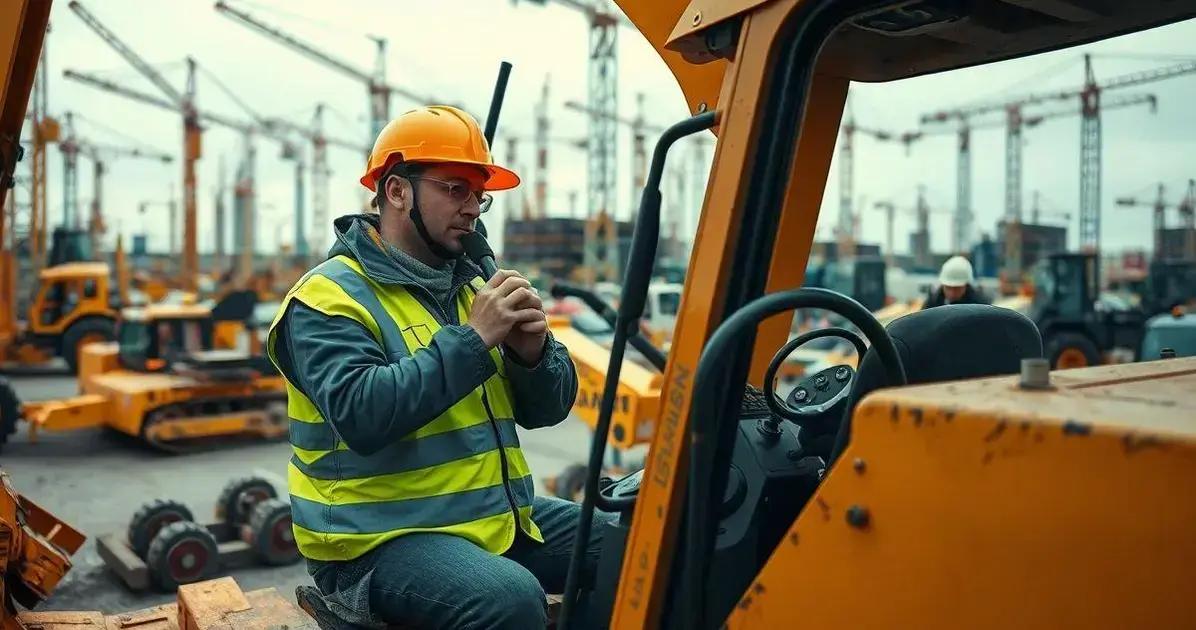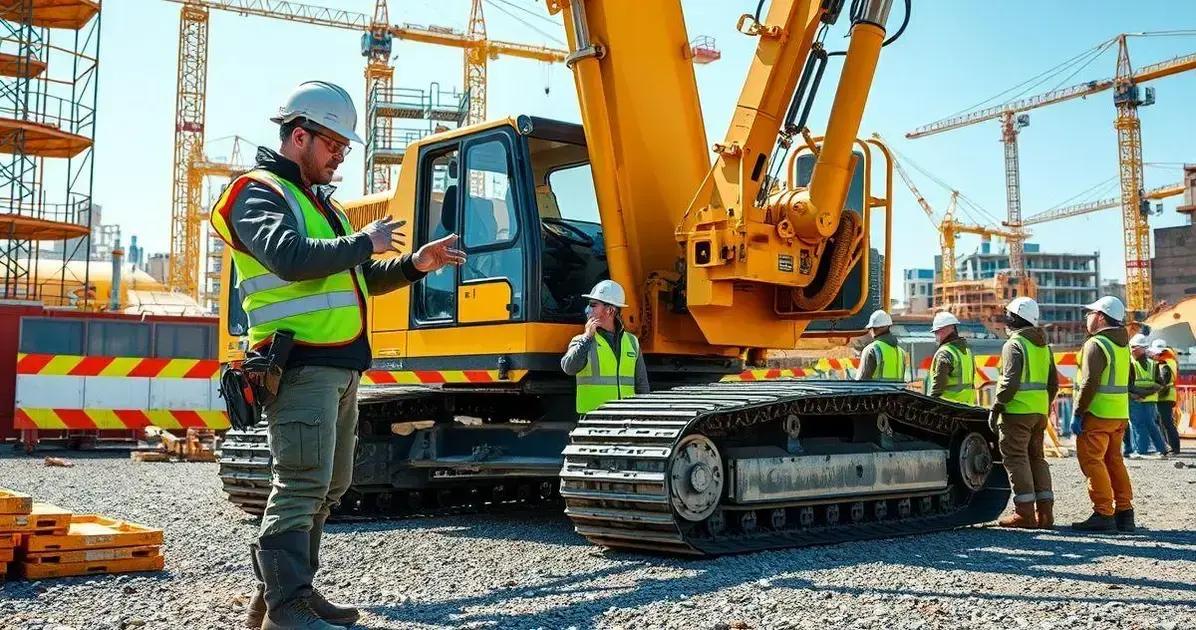Heavy Equipment Operator’s Path: Discover the Unexpected Challenges & Rewards
Anúncios
Becoming a **Heavy Equipment Operator** offers a pathway to a dynamic and rewarding career. This profession involves not only mastering machinery but also adapting to unique challenges. In this post, we’ll explore essential **skills** for operators and the **impact** of technology in this field. Discover everything from safety protocols to career advancement opportunities, and see why being a Heavy Equipment Operator is more than just a job—it’s a commitment to excellence.
Understanding the Role of a Heavy Equipment Operator
A Heavy Equipment Operator is responsible for driving and controlling large construction machinery. This job involves operating bulldozers, excavators, and cranes, crucial for building roads, bridges, and other structures. The operator ensures machines perform tasks safely and efficiently, requiring keen attention to detail.
Essential Duties and Responsibilities
Operators must inspect equipment daily to ensure functionality. Any issues are reported and, if necessary, machines are taken out of service for repairs. Precision is vital when maneuvering machinery in tight spaces. Coordination with other construction personnel enhances workflow and minimizes safety risks.
The Impact of Weather and Terrain
Adaptability is key since operators often work outdoors in varying weather conditions. Mud, rain, or snow can greatly impact equipment performance, requiring operators to adjust techniques accordingly. This adaptability minimizes downtime and maintains project timelines.
The Role in Project Success
Operators are integral to a project’s success. They help shape landscapes and contribute to critical infrastructure projects. Understanding the scope of each project allows operators to maximize equipment use, ensuring each step aligns with project requirements.
Key Skills Needed to Excel as a Heavy Equipment Operator

To excel as a Heavy Equipment Operator, one needs a unique blend of skills. Technical expertise is paramount; this involves understanding each machine’s mechanics and capabilities. Familiarity with maintenance procedures ensures equipment longevity and safety.
Communication and Coordination
Operators work closely with other construction teams. Effective communication is crucial in coordinating efforts and preventing mishaps. Clear signals and the ability to convey messages swiftly make operations smoother.
Problem-Solving and Flexibility
Each site presents unique challenges. Operators must possess strong problem-solving skills, allowing them to adapt and find solutions swiftly. This flexibility helps maintain productivity even when unforeseen issues arise.
Attention to Detail and Safety
Operating large machinery requires a focus on detail. Safety protocols must be followed meticulously, as negligence can lead to dangerous situations. Vigilance in monitoring surroundings, machine health, and site conditions is essential.
Challenges Faced by Heavy Equipment Operators
One of the major challenges faced by Heavy Equipment Operators is working in extreme weather conditions. Whether it’s scorching heat or freezing cold, operators must adapt to keep machinery functional and projects on track.
Equipment Malfunctions
Unexpected equipment breakdowns are another challenge. Operators need to troubleshoot on the spot, requiring a deep understanding of machinery and often leading to delays until repairs are made.
Physical and Mental Demands
Operating heavy machinery is physically demanding, requiring long hours of concentration and precision. This can lead to fatigue, which heightens the risk of accidents if not managed properly with breaks and scheduling.
Working in Confined Spaces
Not all sites offer ample room. Operators often maneuver in tight, confined spaces, demanding high levels of skill and attention to avoid damaging the surroundings or the machinery itself.
Safety Measures Every Heavy Equipment Operator Should Know

Safety measures for Heavy Equipment Operators are vital to prevent accidents and ensure smooth operations. One key practice is performing a thorough pre-operation inspection. This involves checking fluid levels, brakes, and any signs of wear or damage.
Use of Personal Protective Equipment
Operators should always wear appropriate personal protective equipment (PPE), including helmets, gloves, and safety boots. These items reduce the risk of injury should an incident occur on site.
Communication Protocols
Clear and effective communication is essential, using signals or radios to coordinate movements, especially in busy or noisy environments. Miscommunication can lead to severe accidents and delays.
Awareness of Surroundings
Operators need to maintain constant awareness of their surroundings, including other workers, obstacles, and terrain changes. This vigilance helps in avoiding collisions and ensures safe maneuvering on site.
Career Advancement Opportunities in the Field
Career advancement for Heavy Equipment Operators offers several pathways. With experience, operators can transition into supervisory roles where they oversee multiple projects and lead teams. This role requires strong leadership and communication skills.
Specialized Training and Certification
Pursuing specialized training in operating new equipment, such as advanced machinery or technology-driven models, can open up more opportunities. Certifications demonstrate expertise and may lead to higher-paying positions or specialized roles.
Project Management
Operators can explore opportunities in project management. This involves planning, coordinating, and managing construction projects from start to finish, requiring both technical and administrative skills.
Entrepreneurial Opportunities
Some experienced operators choose to start their own businesses, offering contract services to construction firms. This path can be lucrative for those with a strong network and an entrepreneurial spirit.
Impact of Technology on Heavy Equipment Operation

Technology is transforming the field of heavy equipment operation, enhancing efficiency and safety. Modern machinery is equipped with GPS technology, allowing operators to navigate and control equipment with precision, reducing errors and material waste.
Telematics and Data Analytics
Telematics systems provide real-time data on equipment performance, allowing for predictive maintenance and minimizing downtime. Operators can monitor and adjust operations based on data analytics, improving overall efficiency.
Remote Control and Automation
Some heavy equipment now features remote control capabilities, enabling operations in challenging or hazardous environments without risking operator safety. Automation is also gaining ground, with machines performing tasks autonomously to increase productivity.
Virtual and Augmented Reality
Training programs are utilizing virtual and augmented reality (VR/AR) to simulate challenging scenarios, providing a safe and controlled environment for skill enhancement. This technology helps develop operator competencies without real-world risks.
Conteúdo não disponível
FAQ – Common Questions about Heavy Equipment Operators
What are the key skills needed for a Heavy Equipment Operator?
Key skills include technical expertise, effective communication, problem-solving, and attention to safety and detail.
How does technology impact Heavy Equipment Operations?
Technology enhances efficiency and safety with GPS, telematics, remote controls, and VR training, revolutionizing how operators work.
What safety measures should operators be aware of?
Operators should perform equipment inspections, wear PPE, communicate effectively, and stay aware of their surroundings to ensure safety.
What career advancement opportunities exist for operators?
Operators can advance to supervisory roles, specialize in new machinery, explore project management, or start their own business.
What challenges do Heavy Equipment Operators face?
Operators face challenges like extreme weather, equipment malfunctions, physical demands, and maneuvering in confined spaces.






